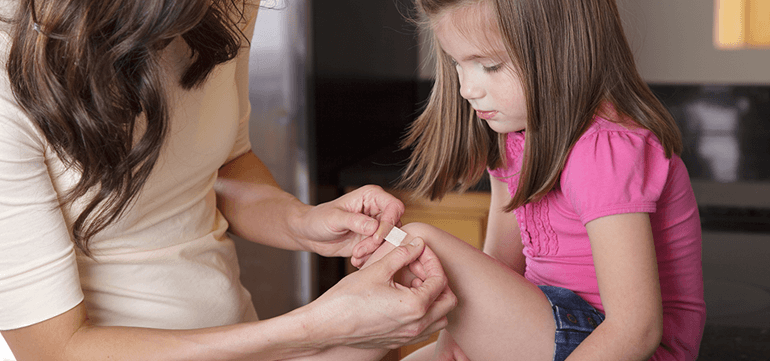What We Treat:
How Long Will it Take for My Wound to Heal?
Did you injury yourself? Did you get bit by an animal? Does your wound need stitches? Is your wound infected? If so, you might have an injury or wound that needs to be watched very carefully. Wounds occur when there is a break or cut in the external skin and tissue. Your damage can be minor or major. Most injuries heal in three stages. First, they clot so you are not always bleeding, then they become inflamed and irritated from the inflammatory response of your body’s cells, and lastly, they start to heal by making new tissue, blood vessels, and skin. One of the most critical aspects of wound care is preventing infection from occurring. Wounds are not contagious, but can cause you to be more at risk for viral and bacterial infections as your body is trying to heal your wound.

Common Symptoms of Wounds
There are many symptoms of a wound, but the most characteristic is a break in the skin with inflammation and bleeding.
Other Common Wound Symptoms Include:
- Redness
- Fever
- Bleeding
- Pain
- Foreign bodies
- Swelling
- Underlying tissue can be seen
- Possible pus and odor if infected
- Warmth to the site of the wound
Who is at Risk for Wounds?
Anyone young or old is at risk for a wound. Children and the elderly are more at risk for injuries due to balance issues. Elderly individuals can also have poor eyesight, which causes them to fall and injure themselves. Children are uncoordinated and can fall causing damage. People who work in a kitchen using knives, as well as individuals who work with animals on a daily basis, are more at risk of a penetrating wound. Persons who have a weak immune system, are malnourished, who smoke, who have multiple chronic illnesses, cancer patients on medication, or people taking steroids are at increased risk for complications from a wound and slower wound healing.
What Will My Doctor Ask Me?
Your doctor is going to investigate your wound fully and how it occurred. They will ask several questions regarding your wound and when it was sustained. Other common questions your doctor will ask you regarding the laceration include:
- How did the wound happen?
- Were you bitten? If so, by what?
- Where is the wound located?
- When did the wound occur? How long has it been since you were injured?
- Are you up-to-date on all your immunizations? Especially tetanus?
- Are you on any medications, specifically an anticoagulant (stops your blood from clotting) or a steroid?
- Do you have any past medical history?
- Are you a smoker?
- Do you have any allergies to any medications, dressings (latex), contrast dye, or numbing agents?
- Have you noticed any pus draining from the wound?
- Have you been running a fever?
How Do I Treat My Wound?
Your doctor will do a full exam on you including the area with the injury. He/she will need to touch the area which may cause you pain. For severe wounds, he/she may numb the area and put on special gloves before touching your wound.
Tests
Depending on where your wound is located, your doctor may order an x-ray if your wound is deep or your wound is from a crush injury. He/she is also looking for foreign bodies (embedded wood, dirt, glass, etc.). If you did experience an injury that was of a crushing type, your doctor might also order your blood to be drawn looking for elevated creatine kinase for evaluation of rhabdomyolysis which is a condition where skeletal muscle breaks down too rapidly, and those products enter the bloodstream. He /she may also obtain a culture of your wound if it is not healing appropriately.
Wound Care
One of the most important factors of wound care is to prevent infection. The wound needs to be cleaned thoroughly. Your doctor may provide you with a numbing agent to reduce your pain before cleaning is to be performed. Once you are numbed up, the cleansing process begins with normal saline. As the doctor or nurse is cleaning the area, they are also looking for foreign bodies, determining how vast and deep the wound is (they will probably measure it), and deciding if it will need stitches or will heal on its own.
Stitches
Depending on the type of wound you sustained and where it is located, you may or may not need stitches. Some wounds can and should be left open, and these include:
- Shallow (superficial) lacerations
- Wounds with little risk of infection
- Wounds with a lot of tissue damage
- Wounds with a high risk of infection that are longer than six hours of age
- Contaminated wounds with items such as animal or human saliva (bites), dirt, feces
Wounds that need to be closed with steri strips (reinforced tape) include injuries that are:
- Shallow
- The edges meet up well
- You can move the area with no problem
If you need stitches due to a deep cut or slice, your doctor will numb the area and use the appropriate type and number of sutures to close the wound. Sometimes he/she will not be able to suture the area closed at the time of injury due to contamination; damage to the joint, ligaments, tendons; if a foreign body is present; or inability to cleanse the wound.
He/she would then close the wound in three to five days when the risk of infection has decreased.
Medications
Your doctor may or may not give you an antibiotic depending on the severity of your wound. If you were bitten by an animal, your wound couldn’t be cleaned well, or if you have a heart valve issue, your doctor will place you on antibiotics to prevent an infection from occurring. They may also put you on antibiotics to prevent infection if you had a filthy wound or didn’t seek care for the wound immediately. The type of antibiotics you will be placed on would be a penicillin derived medication such as Augmentin. Be sure to tell your doctor if you have a penicillin allergy. Your doctor will also give you a tetanus shot if you have not recently had one.
What do I Need to Know About Wounds? – Patient Education
- Keep your wound clean, dry, and intact for forty-eight to seventy-two hours minimum
- Stay alert for signs of the development of infection such as increasing pain, pus, warmth, redness that is spreading, or a red streak traveling to your heart
- Your wound area may develop a scar after healing
Emergency Warning Signs/When to Follow up
- If your wound is on your face or your hands, you need to be seen by an expert in wound management
- If your wound has full thickness skin loss such as in a severe burn, you need to be seen by a specialist in wound management
- If your injury involves your nerves, tendons, or bones, you need to be seen by an expert in wound management
- Follow-up with your doctor in two days for a re-check, dressing changes, or suture removal. The time it takes for the stitches to be ready to be removed depends on where the wound is located. Your doctor will give you an exact date depending on if your wound was on your head, face, hands, legs, or anywhere else.
Why Choose Carefree M.D.?
Carefree M.D. is a safe, secure and reliable way to receive a medical consulation or prescription for your small wound online. We connect you via webcam* or phone with a local board certified doctor.
- One card works for your entire household
- Unlimited 24/7 access to board certified doctors
- No paperwork or waiting-you can use it today
- Month-to-month service with no contracts
Join Today
*Idaho and Delaware only allow video consultations. The state of Arkansas offers an initial video visit and the member may choose phone or video for subsequent visits.

Have Questions?
Call 888-899-8297 or visit our contact page.


